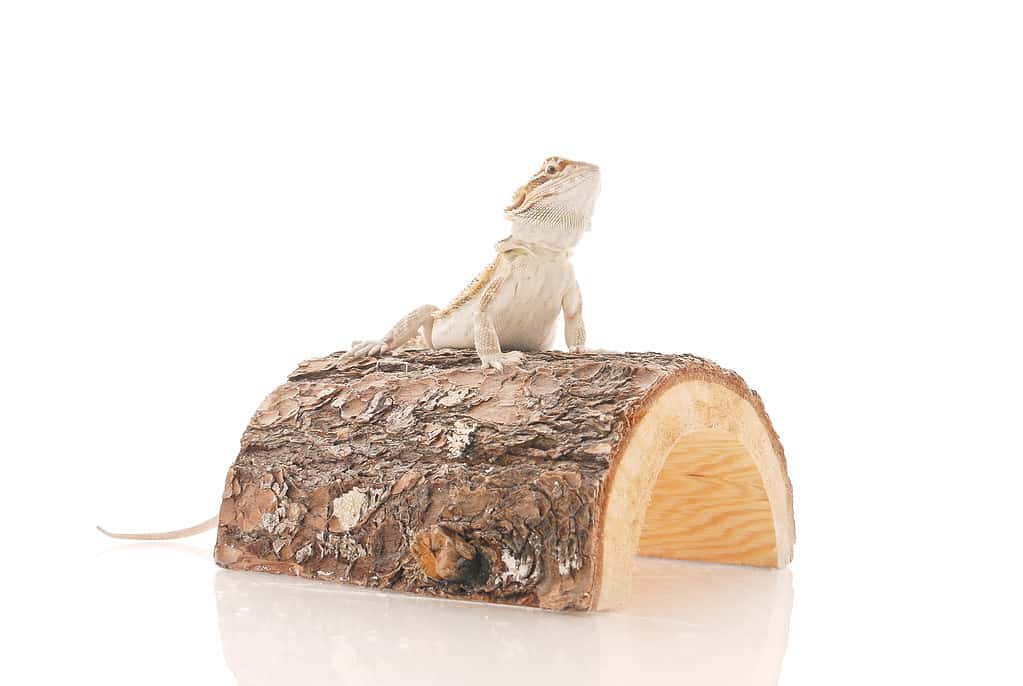It’s fun to have a bearded dragon as a pet. With any pet, paying attention to their needs and what they like is crucial. Not everyone is the same; the same goes for bearded dragons. As a bearded dragon owner, you will experience plenty of mishaps and fun adventures for your pet. It is essential to remember never to force an animal to do anything it does not feel comfortable doing. It’s also wise to check for any hazards that could injure your dragon. First, let’s find out if bearded dragons CAN swim.
Bearded Dragons

In the wild, bearded dragons love swimming.
©Dudley Simpson/Shutterstock.com
Bearded dragons have become popular among exotic pet owners in recent years. They can provide hours of entertainment and are relatively easy to maintain. Like all pets, educating yourself thoroughly before bringing a bearded dragon home is essential. They are not a short commitment like rodents and some reptiles. Bearded dragons can easily live up to 15 years with the correct care and an environment best suited for them.
As reptiles, bearded dragons are cold-blooded, and becoming too cold will kill them. Having the proper safe heating device and having a well-rounded idea of what to expect, your job is and will be for over a decade as a bearded dragon parent and owner.
Join Bearded Dragon Social Media Groups
You will find groups on social media geared explicitly towards bearded dragon husbandry and care. It is highly advised to join a couple of well-educated groups. They will typically have lists posted regarding housing, food, water, heat, and fun activities for your dragon.
The groups are for experienced owners and breeders but also new owners. You will often learn more about what to avoid with your pet and what is very important to do. It will help ease your anxiety regarding emergencies, problem-solving, and answers not easily found online.
It can be great to find terrific resources online, though if you are starting, it might be tricky to weed through the incorrect information and find the truth. This is where groups on social media come in.
Helping Your Bearded Dragon Stay Safe

Always dry your dragon after swimming and put them under their heat lamp so they do not get cold.
©Jovani Carlo Gorospe/iStock via Getty Images
To answer the opening question of whether or not a bearded dragon can swim, yes, they can swim very well. Swimming is an activity most bearded dragons love to do. While it can be great fun for your bearded dragon, you must also follow some essential guidelines to ensure the health of your little friend.
1. Water Temperature
It is vital to make sure the water is not too hot or too cold for your dragon before allowing it in the water. If the water is too cold, it can be a death sentence for your buddy. Hot water is also a bad idea. Aiming to have the water lukewarm and between 90 – 100 degrees Fahrenheit would be best.
2. Chemicals and Other Toxins Can Be Deadly
Many animals and people are sensitive to chemicals and toxins. What may seem perfectly safe for you might not be for your dragon. Never use any soaps, bubbles, bath bombs, salts, or additives to the water your dragon will swim in. Knowing if your tap water has a heavy chemical load is also important. You will want to avoid chlorinated water and opt for water that is as close to fresh as possible. If you will be using a container for your bearded dragon to swim, consider using spring or reverse osmosis water, which can be purchased by the gallon or in bulk. It is inexpensive and your safest choice.
3. Never Leave Your Dragon Alone While They Are Swimming
Treat your dragon like you would a small child in a bathtub. Please do not leave them alone ever. They could drown or have other issues while swimming. It would be devastating to leave the room briefly only to return and find a deceased dragon. Most dragons are excellent swimmers, but they can run into problems. They can stay underwater for up to one minute, but anything longer should be avoided.
4. Watch Your Dragon’s Body Language
Not every bearded dragon will be excited about swimming. Most do love it, but if they don’t, that’s okay too. Please pay attention to your dragon’s body language; they will let you know they are or are not enjoying themselves. For example, if they puff their beard out, they say they aren’t happy and want to be out of the water. If you find your dragon going in reverse or trying to escape while slowly lowering them down to the water, they say swimming isn’t for them. Never force your bearded dragon into the water. Moving your pet to do something it doesn’t want is not cute or safe.
5. Swimming Pool For One, Please
You can allow your bearded dragon to swim in your bathtub, but it will take some work before and after they swim. They cannot be around chemicals or any soaps. Household cleaners fall into that category. You could opt to use a kiddie swimming pool that only they will use or another container, also only for them to use. This is because they can carry salmonella. Salmonella can make you very sick, and some people die from the side effects. Maintaining proper hygiene in your bathtub is important, especially if you have children. Children can die from salmonella. If you use your bathtub, spray it with bleach after your dragon is finished swimming.
The photo featured at the top of this post is © Renata Eloize/iStock via Getty Images
Thank you for reading! Have some feedback for us? Contact the AZ Animals editorial team.







